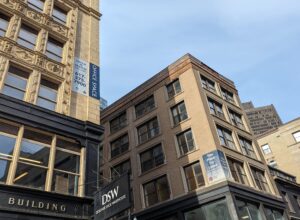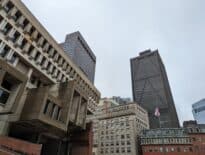
Office buildings with vacant space at the corner of Washington and Bromfield streets in downtown Boston in January 2024. Boston’s office market ended last year with a vacancy rate of 15.8 percent, up from 12.5 percent the previous year. Photo by James Sanna | Banker & Tradesman Staff
Boston Mayor Michelle Wu is seeking the option of shifting a larger portion of the city’s property tax levy onto commercial and industrial properties as soon as fiscal year 2025 to compensate for anticipated declines in values.
The Home Rule petition would allow Boston to exceed the maximum shift in the commercial-residential dual tax structure allowed under state law for five years. It would cushion a potential steep increase in residential property taxes, Wu said.
Because commercial assessments, particularly for office buildings, are expected to decline amid rising vacancies, many commercial landlords would not necessarily receive higher tax bills if the change is adopted and the commercial tax rate rises.
“It’s portrayed as we’re now asking commercial properties that are struggling to pay more,” Wu said during a press briefing today. “If done right, they would still pay less in taxes, but not as low as they would have, so that residential taxes don’t go up dramatically.”
A study released in March by the Boston Policy Institute and Tufts University estimated that Boston could face a $500 million dip in annual property tax collections, representing nearly 12 percent of its budget, by 2029. The downturn reflects the projected decline in commercial property values, primarily because of office buildings’ declining occupancy rates and rents.
Most office buildings’ assessments are tied to their rental income. Boston’s office market ended 2023 with a vacancy rate of 15.8 percent, up from 12.5 percent in the fourth quarter of 2022, according to CBRE data. Average lease rates declined from $66.60 to $63.39 per square foot on a gross basis over the same 12 months.
Wu’s proposal would increase the commercial-industrial sector’s share of the total tax levy from 175 to 200 percent, and decrease gradually over five years back to the original share. It gives the city a three-year window from fiscal 2025 to 2027 to start the new formula, based upon yet-to-be-determined assessments for upcoming fiscal years.
The state legislature approved a similar temporary shift in 2004 under former Mayor Tom Menino, after the dotcom meltdown reduced commercial property values while residential values continued to rise.
Housing Production Tax Break Still Alive
The administration also is studying other ways to encourage development to generate new property taxes, Wu said, amid the dropoff in both residential and commercial projects attributed to higher project costs and interest rates.
After rejecting the idea earlier this year, Wu said she is looking at various incentives for new development ranging from direct tax abatements to deferrals. A study by Harvard University professor Edward Glaeser commissioned by the administration in 2023 suggested giving multifamily developers property tax abatements up to 75 percent, with a maximum of $5,000 per unit annually.
“There are lots of different options that come with different costs for the city, and we need to understand what the [housing] production might be that goes along with each of those options to assess what might be fiscally prudent for the city to take on,” Wu said.
Thomas O’Brien, managing director of Boston-based developer HYM Investment Group, offered support for the proposal during the briefing. O’Brien said the proposal will help cushion the high cost of housing in Boston.
“It’s our hope in the near future the proposal can also be paired at some point with some ideas about potential new growth and new projects, and to encourage those,” O’Brien added.
Fears of a ‘Doom Loop’
But the leader of a statewide apartment landlord group said the proposal could drive commercial and industrial development into the suburbs.
“That starts a negative feedback loop that will drive away additional commercial and industrial uses,” said Doug Quattrochi, executive director of MassLandlords, in an email. “Nobody has to set up shop in Boston.”
An author of the Boston Policy Institute study said in a recent interview that shifting a larger burden to commercial properties would have limited effectiveness.
“In a healthy industry when you raise taxes, the industry can absorb those taxes,” said Evan Horowitz, executive director of The Center for State Policy Analysis at Tufts University. “If they go this route and increase taxes, it’s largely self-defeating. An effort to increase taxes is going to accelerate the decline in prices.”
In a statement released Thursday afternoon, Greater Boston Real Estate Board CEO Greg Vasil echoed Horowitz’s analysis.
“Commercial buildings and their values are in an unsettling downward transition period in our post-Covid world. We are deeply concerned that increasing commercial tax rates to recoup lost revenue will only take us closer to the urban doom loop being seen in many other American cities,” Vasil said. “Businesses have carried a tremendous fiscal burden for the city, and pushing them harder at a time when their buildings have lost value is fiscally irresponsible. This is a time unlike any other in the last 30 years, and piling more financial burdens on a struggling industry is no solution at all. Instead, city and state leaders must focus on making the city more attractive to all types of businesses to bolster our economy – and the city’s coffers – now and into the future.”
Currently, commercial-industrial properties are taxed at more than double the rate of residential properties. In the current fiscal year, commercial and industrial properties pay $25.27 per thousand dollars of value, while residential properties pay $10.90.
The commercial-industrial sector pays 58 percent of the tax levy, despite representing only 33 percent of the city’s taxable values, according to Boston Municipal Research Bureau data.
Boston assessors received 1,715 applications for commercial-industrial property tax abatements in time for the annual Feb. 1 deadline, a decline of 1,813 from the previous year. The volume represents 1 percent of the citywide inventory of taxable properties, according to the mayor’s office.
Editor’s Note 4:10 p.m. March 28, 2024: This story has been updated with comment from the Greater Boston Real Estate Board




 |
| 



